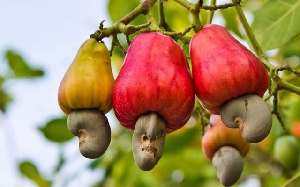The country has emerged as the number one exporter of cashew in–shell for the year 2016.
Ghana raked in $981 million ($981,158,000) as the value of total exports of cashew in 2016.
Ghana controls 43.8% of global in-shell cashew exports
A report posted on the web portal of Ghana Export Promotions Authority (GEPA) said this represents 43.8% of total global exports of cashew in-shell.
Vietnam and India are top destinations for Ghana’s cashew
Major market destinations for Ghana's cashew in 2016 are Vietnam, where total exports amounted to $533 million, and India, consuming $445 million worth of Ghana cashew.
Although Ghana’s growth rate in Vietnam is remarkable, threats of competition from mainly Tanzania are real, the report said.
Ghana’s sub-regional competitors
Sub-regional competitors in Vietnam include Burkina Faso - $27.3 million; Nigeria - $24.8 million; Benin - $26.3 million; La Cote d'Ivoire - $340,737; Guinea Bissau - $209,390; and Senegal - $1.6 million.
Ghana’s main competitors outside ECOWAS
Ghana’s main competitors outside ECOWAS include Tanzania ($333,766) and Indonesia ($100,261) in 2016.
Vietnam became a major market destination for Ghana’s cashew in 2016, with an average growth rate of about +168% between 2012 and 2016.
The report noted that over the last decade, Ghana’s cashew has principally been exported to India.
President Akufo-Addo launches 10-year Cashew Development Plan
Last month, President Nana Akufo-Addo launched the 10-year Cashew Development Plan, aimed at diversifying Ghanaian agriculture.
He said as part of the plan to boost the production of cashew, the Rural Development Department of the Ministry of Local Government and Rural Development, together with the Ministry of Food and Agriculture, are spearheading the initial production of seedlings for the cultivation of cashew in the country.
Mass spraying of cashew farms
Towards the improvement of the country's current yield, he said, the Ghana Export Promotion Authority commissioned a cashew mass spraying exercise in Wenchi, involving the provision of GH¢1.6 million for the spraying of some 30,000 hectares of cashew plantation.
Production to increase by 30%
This is expected to increase cashew production for this crop year by some 30%.
Ghana continues to lead the way in high yields of 800kg/hectares as against the international benchmark of 1500kg/hectares.
These initiatives, the President added, form an integral part of the Cashew Development Plan, with the plan seeking to improve research methods, introduce appropriate production and processing technologies, as well as develop marketing strategies, amongst others, along with the value chain.
He, therefore, urged the Ministry of Food and Agriculture and the Ghana Export Promotion Authority to incorporate, in this plan, policies and interventions that would create additional businesses and job opportunities in the areas of storage, transport, and packaging of cashew, which will ensure that our cashew farmers earn higher incomes.
President Akufo-Addo reiterated the commitment of his government to follow through fully on the implementation of this plan, in addition to other programmes, to propel the growth of the cashew industry.
Local processors bemoan lack of raw cashew
Meanwhile, lack of access to cashew nut by local processors has been identified as a major challenge in the cashew industry in Ghana.
Less than 10% of raw cashew processed in Ghana
Though the country has processing capacity to match production, less than 10% of its production is processed locally.
Only 10% of African raw cashew nuts is processed (shelled) locally.
The vast majority is exported in-shell to some of the world's main hubs for cashew shelling in India and Vietnam.
Farmers export raw cashew to make better money
The farmers prefer to export to make more money as they claim the price offered by local processors is low, compared to what the international market offers.
The situation is said to be undermining the potential of the industry to transform the local economy through creation of thousands of jobs along the value chain.
13 Local cashew processing companies in Ghana
A total of 13 local cashew processing companies are said to have been idle due to challenges in procuring enough cashew nut to feed the factories.
Information indicates that only USIBRAS, the biggest cashew processing company in West Africa, and Mim Cashew in the Brong Ahafo Region get some raw cashew to process, but that is below capacity.
Ghana could process all its production and sustain the industry locally should farmers sell to local processors before attending to buyers from outside the sub-region.
Ghana losing over GH?100m through export of raw cashew
Checks indicate that the country is losing some GH?100 million a year for not processing enough cashew locally.
Global demand for cashew growing
Global demand for cashew is growing, with Africa producing 53% of the world’s cashew.
The crop is said to have potential for climate change mitigation and poverty alleviation, and if efficiently exploited, it could transform local economies by 2030.
Cashew cultivation started in 1960s
Since the early 1960s when cashew cultivation began in Ghana, it has steadily, albeit slowly, blossomed into a significant economic tree crop with a high potential of leading the non-traditional export category in foreign revenue generation.
The steady growth of the cashew sub-sector may be largely attributed to the relative stability and the conducive business environment in the country, as well as the concerted action of private sector players, non-governmental organisations (NGOs) and some state agencies, to ensure a vibrant cashew sub-sector.
Although the earliest cashew farms were started irregularly in the Central and Greater Accra regions, over the years, the Brong Ahafo, Northern, Upper East and West regions had established themselves as consistent cashew producers in Ghana.
In the crop’s infant years in Ghana, the lack of appropriate husbandry practices, the absence of market structures and the resultant low producer prices seriously impeded the development of cashew as an attractive cash crop.
Until the early 1980s when it was identified as a major non-traditional crop in the government’s efforts to diversify the country’s export base, cashew cultivation in Ghana had received far too little national recognition.
The efforts of expert groups like the Ministry of Agriculture’s Agro-Forestry Unit, the Forestry Commission, the Ghana Export Promotion Council, the Africa Cashew Alliance, the African Cashew Initiative (which enjoys funding from the Bill and Melinda Gates Foundation), some financial institutions, a number of stakeholder NGOs and private companies have contributed immensely to the transformation of cashew farming into its present stature.
Today, Ghana’s cashew industry directly engages at least 300,000 farmers on a full-time basis, along with a range of ancillary employment avenues for some 200,000 people who work as agents, transporters, shippers, etc.
The cashew crop in Ghana has grown from a meagre 4,000 metric tonnes per annum as recorded in 1997 to about 70,000 metric tonnes recorded 2016 and boasts of some 13 processing companies with an installed capacity of 35,000 metric tonnes per year.
Characteristically, Ghana exports quite a larger volume of cashew than it produces, thanks, possibly, to what is perceived as her conducive business environment, which encourages inflows of considerable quantities of nuts from neighbouring countries like La Cote d’Ivoire and Burkina Faso.
Although the cashew business environment in Ghana has improved tremendously in recent years, following the sharp hike in demand for raw nuts in many overseas consumer markets, Ghanaian cashew farmers, for good reason, are worried and apprehensive about the future and the sustainability of their businesses.
It is important to note that in Ghana, the cashew crop is predominantly cultivated by smallholder farmers, who, altogether, account for about 88% of cashew farms.
On the average, each of these smallholder farms ranges in size from 0.8 hectares to 3.0 hectares and the majority rely on family labour or hired labour, especially for weeding and harvesting.
Business News of Tuesday, 13 March 2018
Source: thefinderonline.com













